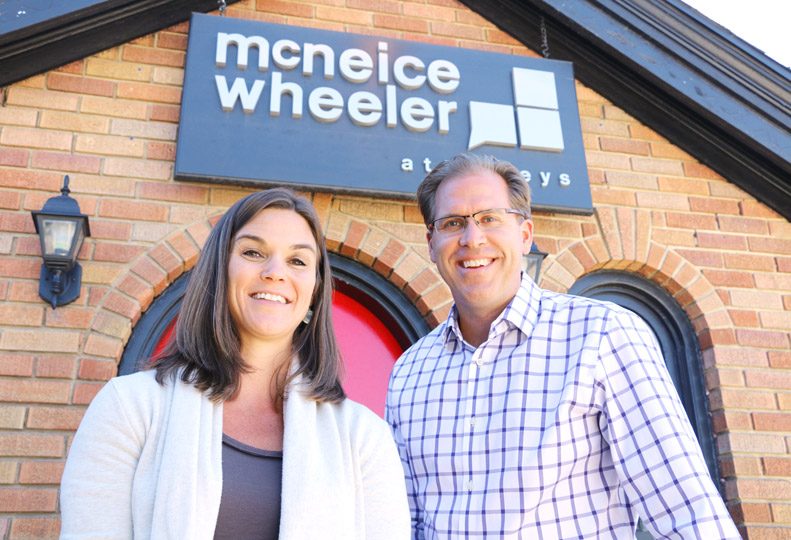
Home » McNeice Wheeler adds expertise to match demand
McNeice Wheeler adds expertise to match demand
Law firm doubles staff, mulls additional space

September 22, 2016
McNeice Wheeler PLLC, a Spokane Valley-based law firm, has been expanding its staff in recent years to meet a rising demand for legal services, principals there say.
“We’re consistently expanding in all areas,” says founding partner Ryan McNeice. “It makes sense, because as we add more staff in varying specialties, they also bring business with them.”
McNeice says that in the last two years, the firm, which started with a staff of four, has more than doubled in size and now includes seven attorneys, three interns, and an office manager.
“We’ve come to feel that collaboration is really important. It’s exciting, and it’s ultimately more effective,” he says. “With that in mind, we set out to find people who would bring unique specialties to the table but also complement our team.”
McNeice launched the firm as a solo practice in 2005, asking fellow Gonzaga University School of Law graduate Becki Wheeler to join him there in 2008.
“We both grew up in Spokane and went to school here, so it just felt natural to open a law firm here,” he says. “Both of us also specialize in estate planning and business law.”
The firm’s other attorneys include Tom Shrum, who works mostly in intellectual property law; Robin Haynes, who focuses on employment law and is president-elect of the Washington State Bar Association; Chris Crago, who specializes in tax and retirement law; Alison Erickson, a former intern who’s involved in family law; and Joe Murphy, who focuses on tax law and also provides the firm with a Seattle presence.
Interestingly, all of the firm’s attorneys share a common connection to Gonzaga University, having either attended there as undergraduates or at the Jesuit university’s law school.
“We’re pretty big Gonzaga fans here,” says McNeice. “Our interns are all Gonzaga law students as well.”
McNeice Wheeler offers a full range of legal services, from business law and civil litigation to personal injury, family law, and estate planning, among others.
Wheeler says a majority of the firm’s cases deal with personal injury, business law, and estate planning. She estimates the firm sees about 800 cases each year and works on many of them collaboratively.
“Thinking about it, there’s not all that much in law we haven’t done at some point,” Wheeler says. “We serve clients throughout Washington and Idaho, and three of our attorneys are licensed to practice in both states.”
Although one of its attorneys operates out of a Seattle office, most of the firm’s staff members work at its main office, a 2,500-square-foot space at 11404 E. Sprague.
However, McNeice says that given the rapid growth the firm has been experiencing, it’s already begun considering additional office space.
“We’re thinking of creating a downtown location,” he says. “There’s still a lot to consider before we decide, simply because we don’t yet know how much more we’ll grow.”
While noting that law school attendance has declined nationally in recent years, both McNeice and Wheeler say they’re optimistic about future employment in the industry.
“The need for legal services will always be there, and currently, that need outstrips the number of available attorneys,” says McNeice. “The decline in enrollment might indicate students aren’t as optimistic about the profession, but then again, they may simply be concerned about high costs and the ability to secure a job quickly following school.”
He says the biggest thing for emerging professionals to remember when beginning a career in law is to find the right environment in which to practice.
“Practicing law can be very satisfying,” he says. “The thing is, you have to be very intentional about finding an environment that suits your needs, whether it’s joining a firm or starting your own practice.”
Wheeler agrees, saying, “The thing about our firm is that we really enjoy working together. We also make time to have fun together through social and community events.”
In addition to its collaborative atmosphere, the firm has what its principals say might be considered a unique billing system, with each attorney tracking their own hours.
“I’d say our system provides a level of independence and autonomy,” says McNeice.
He adds, “There’s no micro-managing, or set hours. Instead, each attorney is responsible for scheduling as much or as little time as needed to satisfy the client’s needs, and tracking their hours with our billing software.”
McNeice says that keeping technology, such as billing systems, information storage, and networking infrastructures up to date has been an additional challenge for the firm recently, especially given its recent addition of attorneys to the staff.
“Technology itself has been phenomenal for the legal profession in recent years,” McNeice says. “In a way, it’s liberated the way we practice law because we no longer have to stay in one location.”
Wheeler agrees, saying, “New technology has changed how we’re allowed to access information, as well as how we’re allowed to disseminate it between attorneys. It’s fairly common now to have electronic service agreements that dictate how files and documents are able to be shared, particularly on larger cases.”
According to McNeice, technology also has changed how attorneys look at the processes of electronic discovery, serving legal notices, and handling depositions.
“It used to be that in order to depose an expert, you had to travel. Now, we can do that over videoconference,” McNeice says.
He adds, “You still see some attorneys that ask to have files faxed or delivered, but most are getting on board now.”
McNeice declines to disclose the firm’s annual billings.
Latest News Up Close
Related Articles




